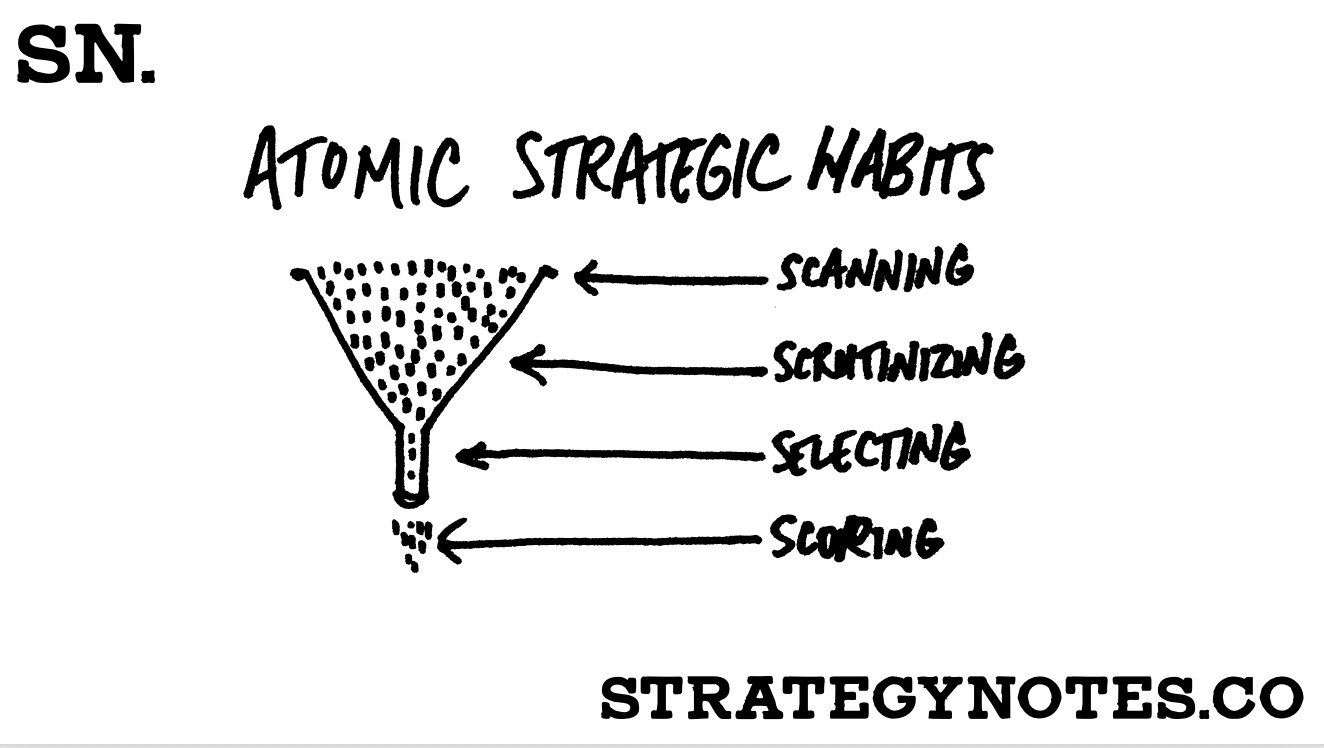“Strategist” has become a title, but it’s much more. It’s a habit, it’s a practice, it’s a way of approaching the world.
“We are what we repeatedly do,” the historian Will Durant once paraphrased Aristotle. “Excellence, then, is not an act but a habit.”
* * * * * * * * * *
James Clear knows habits. His book, Atomic Habits, has racked up #1 lists—New York Times, Wall Street Journal, Amazon—like little league trophies. Its success is well-earned for its ability to shine light on the importance of “small and mighty” life changes and the remarkable results that follow. Habits can snowball into superpowers (or super-demons).
Clear characterizes atomic habits as a “regular practice or routine that is not only small and easy to do, but also the source of incredible power.”
He explains good habit forming and bad habit breaking. Getting into an exercise routine and getting out of a smoking routine. Getting into a writing practice and getting out of a no-end Netflix rut. Getting into positive thinking and getting out of a negative view.
It sparked me to ask: What are the strategist’s habits? Strategic breakthroughs are just the perceptible outputs. What process creates them? What’s the engine look like under that shiny hood?
Some lean far too heavily on others—when in doubt, defer to a Great One.
“What would Clausewitz do?”
“What would Boyd do?”
“What would Sun Tzu do?”
“What would Christensen or Collins do?”
But outsourcing ideas has limited value. All strategy is bespoke, tailor-made. Generic solutions won’t cut it. Strategy-by-algorithm becomes predictable, and predictable produces piles of losses.
So strategists must think strategically for themselves.
* * * * * * * * * *
The common system of strategic thought for strategists of all stripes is fairly simple. There are four stops on the cycle. They’re not always performed in order. At times, they go one by one. At times, they’re out of step. At times, they’re done in parallel, in real-time. It depends on the context, the challenge, the pressure, the adversary.
But all strategists are essentially decision funnels. Ideas in, decisions out. Aim for success, however defined. Of course, the possibilities are endless, but superior decisions are the only way to find and fuel a successful way forward.
Here’s the system of atomic strategic habits that make strategists strategists:
Strategists SCAN. They use scenarios to spot possibilities. They reach wide for solutions.
Strategists SCRUTINIZE. They use “mental contrasting,” a thinking process whereby a subject balances positive and negative, pro and con, when considering a new idea or goal. It’s a sorting process, sifting for gold from a plate of pyrite.
Strategists SELECT. They either make decisions or aid decision-makers. They make clear choices about the best path ahead.
Strategists SCORE. Constant reassessment using feedback loops. Strategists reassess and reassess and reassess. They’re always a bit panicked and paranoid. Because strategy presupposes a flesh-and-blood adversary or a dangerous environment—both threaten strategic obsolescence at any moment.
* * * * * * * * * *
*Afterthought: “You can never plan the future by the past.” (Edmund Burke)
*Editor’s Note: What do you think? Have I missed any habits here? Please let me know with a comment, and, if you enjoyed this, forward it on to anyone you think might benefit or find it of interest. Your word-of-mouth mention to another person means everything to this little community’s continued growth.
All the very best & see you next week, Matt





"So strategists must think strategically for themselves." Really hits a cord. I read the book and thought it was very good. However, after starting my very first course in Global Security, I think if I go back and re-read certain parts, i will probably be seeing them in a completely different light.
Hassan, I'll be taking this on next week - I'll be discussing the value of strategic amputation - of discarding that which does not work and that which is actually threatening the long-term viability of the greater organization/organism. I think you'll dig it, in part, because I think it suggests that we really do have to think for ourselves. To step outside our social selves, which is really, really hard to do. Thanks for reading!